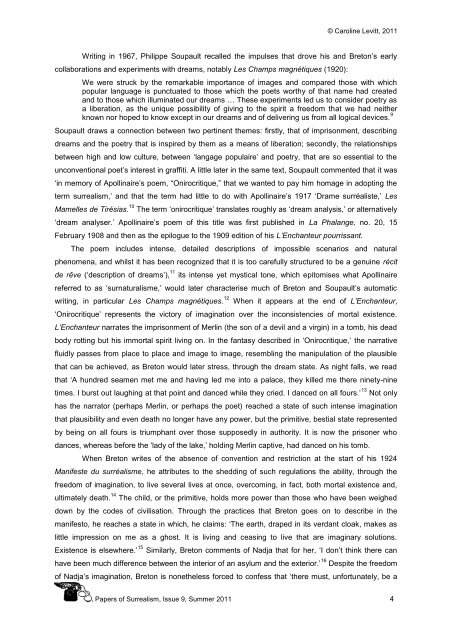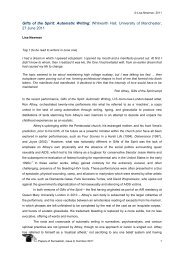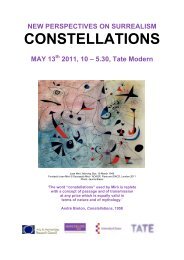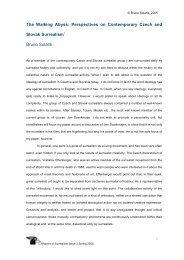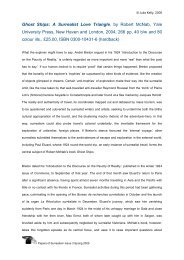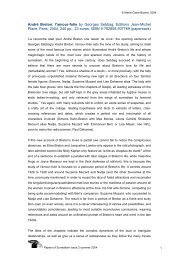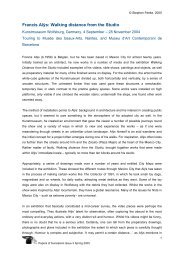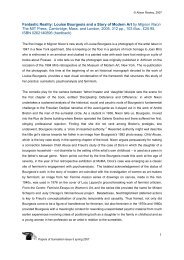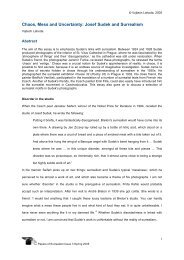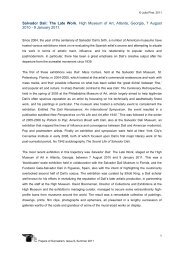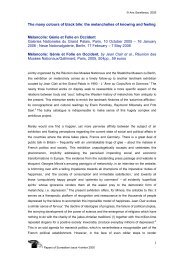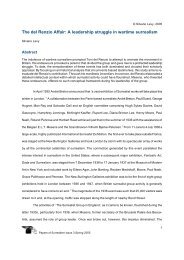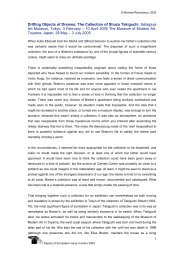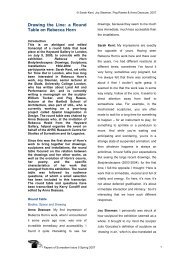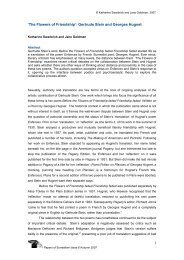From the Walls of Factories to the Poetry of the Street: Inscriptions ...
From the Walls of Factories to the Poetry of the Street: Inscriptions ...
From the Walls of Factories to the Poetry of the Street: Inscriptions ...
Create successful ePaper yourself
Turn your PDF publications into a flip-book with our unique Google optimized e-Paper software.
© Caroline Levitt, 2011<br />
Writing in 1967, Philippe Soupault recalled <strong>the</strong> impulses that drove his and Bre<strong>to</strong>n‟s early<br />
collaborations and experiments with dreams, notably Les Champs magnétiques (1920):<br />
We were struck by <strong>the</strong> remarkable importance <strong>of</strong> images and compared those with which<br />
popular language is punctuated <strong>to</strong> those which <strong>the</strong> poets worthy <strong>of</strong> that name had created<br />
and <strong>to</strong> those which illuminated our dreams … These experiments led us <strong>to</strong> consider poetry as<br />
a liberation, as <strong>the</strong> unique possibility <strong>of</strong> giving <strong>to</strong> <strong>the</strong> spirit a freedom that we had nei<strong>the</strong>r<br />
known nor hoped <strong>to</strong> know except in our dreams and <strong>of</strong> delivering us from all logical devices. 9<br />
Soupault draws a connection between two pertinent <strong>the</strong>mes: firstly, that <strong>of</strong> imprisonment, describing<br />
dreams and <strong>the</strong> poetry that is inspired by <strong>the</strong>m as a means <strong>of</strong> liberation; secondly, <strong>the</strong> relationships<br />
between high and low culture, between „langage populaire‟ and poetry, that are so essential <strong>to</strong> <strong>the</strong><br />
unconventional poet‟s interest in graffiti. A little later in <strong>the</strong> same text, Soupault commented that it was<br />
„in memory <strong>of</strong> Apollinaire‟s poem, “Onirocritique,” that we wanted <strong>to</strong> pay him homage in adopting <strong>the</strong><br />
term surrealism,‟ and that <strong>the</strong> term had little <strong>to</strong> do with Apollinaire‟s 1917 „Drame surréaliste,‟ Les<br />
Mamelles de Tirésias. 10 The term „onirocritique‟ translates roughly as „dream analysis,‟ or alternatively<br />
„dream analyser.‟ Apollinaire‟s poem <strong>of</strong> this title was first published in La Phalange, no. 20, 15<br />
February 1908 and <strong>the</strong>n as <strong>the</strong> epilogue <strong>to</strong> <strong>the</strong> 1909 edition <strong>of</strong> his L’Enchanteur pourrissant.<br />
The poem includes intense, detailed descriptions <strong>of</strong> impossible scenarios and natural<br />
phenomena, and whilst it has been recognized that it is <strong>to</strong>o carefully structured <strong>to</strong> be a genuine récit<br />
de rêve („description <strong>of</strong> dreams‟), 11 its intense yet mystical <strong>to</strong>ne, which epi<strong>to</strong>mises what Apollinaire<br />
referred <strong>to</strong> as „surnaturalisme,‟ would later characterise much <strong>of</strong> Bre<strong>to</strong>n and Soupault‟s au<strong>to</strong>matic<br />
writing, in particular Les Champs magnétiques. 12<br />
When it appears at <strong>the</strong> end <strong>of</strong> L’Enchanteur,<br />
„Onirocritique‟ represents <strong>the</strong> vic<strong>to</strong>ry <strong>of</strong> imagination over <strong>the</strong> inconsistencies <strong>of</strong> mortal existence.<br />
L’Enchanteur narrates <strong>the</strong> imprisonment <strong>of</strong> Merlin (<strong>the</strong> son <strong>of</strong> a devil and a virgin) in a <strong>to</strong>mb, his dead<br />
body rotting but his immortal spirit living on. In <strong>the</strong> fantasy described in „Onirocritique,‟ <strong>the</strong> narrative<br />
fluidly passes from place <strong>to</strong> place and image <strong>to</strong> image, resembling <strong>the</strong> manipulation <strong>of</strong> <strong>the</strong> plausible<br />
that can be achieved, as Bre<strong>to</strong>n would later stress, through <strong>the</strong> dream state. As night falls, we read<br />
that „A hundred seamen met me and having led me in<strong>to</strong> a palace, <strong>the</strong>y killed me <strong>the</strong>re ninety-nine<br />
times. I burst out laughing at that point and danced while <strong>the</strong>y cried. I danced on all fours.‟ 13 Not only<br />
has <strong>the</strong> narra<strong>to</strong>r (perhaps Merlin, or perhaps <strong>the</strong> poet) reached a state <strong>of</strong> such intense imagination<br />
that plausibility and even death no longer have any power, but <strong>the</strong> primitive, bestial state represented<br />
by being on all fours is triumphant over those supposedly in authority. It is now <strong>the</strong> prisoner who<br />
dances, whereas before <strong>the</strong> „lady <strong>of</strong> <strong>the</strong> lake,‟ holding Merlin captive, had danced on his <strong>to</strong>mb.<br />
When Bre<strong>to</strong>n writes <strong>of</strong> <strong>the</strong> absence <strong>of</strong> convention and restriction at <strong>the</strong> start <strong>of</strong> his 1924<br />
Manifeste du surréalisme, he attributes <strong>to</strong> <strong>the</strong> shedding <strong>of</strong> such regulations <strong>the</strong> ability, through <strong>the</strong><br />
freedom <strong>of</strong> imagination, <strong>to</strong> live several lives at once, overcoming, in fact, both mortal existence and,<br />
ultimately death. 14 The child, or <strong>the</strong> primitive, holds more power than those who have been weighed<br />
down by <strong>the</strong> codes <strong>of</strong> civilisation. Through <strong>the</strong> practices that Bre<strong>to</strong>n goes on <strong>to</strong> describe in <strong>the</strong><br />
manifes<strong>to</strong>, he reaches a state in which, he claims: „The earth, draped in its verdant cloak, makes as<br />
little impression on me as a ghost. It is living and ceasing <strong>to</strong> live that are imaginary solutions.<br />
Existence is elsewhere.‟ 15 Similarly, Bre<strong>to</strong>n comments <strong>of</strong> Nadja that for her, „I don‟t think <strong>the</strong>re can<br />
have been much difference between <strong>the</strong> interior <strong>of</strong> an asylum and <strong>the</strong> exterior.‟ 16 Despite <strong>the</strong> freedom<br />
<strong>of</strong> Nadja‟s imagination, Bre<strong>to</strong>n is none<strong>the</strong>less forced <strong>to</strong> confess that „<strong>the</strong>re must, unfortunately, be a<br />
Papers <strong>of</strong> Surrealism, Issue 9, Summer 2011 4


